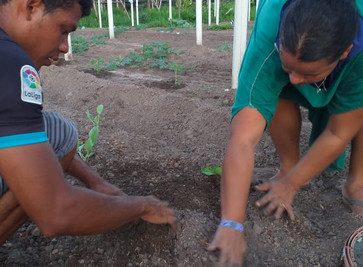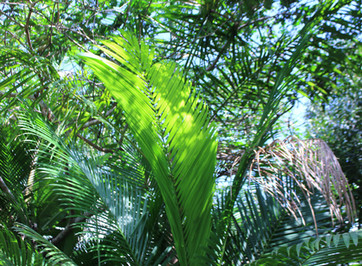
BRAZIL
Created and led by the indigenous Ashaninka people, this project to plant a forest garden of native fruit trees over ten years has environmental action and social impact at its core.
PLANTING PARTNER
Aquaverde

Yorenka Tasorentsi Forest Garden
Deep in the Amazon rainforest on the border of Brazil and Peru, this locally-led, community-based project aligns deeply with our ethical, anti-colonialist approach to reforestation.
Benki Piyãko, an Ashaninka spiritual leader, designed this ten-year agroforestry project to preserve the Amazon's biodiversity by changing a degraded landscape invaded by African grass and non-native trees into a flourishing native forest garden of 10 million fruit trees.
TreeSisters supports this by funding at least 25,000 trees annually at the site. The trees not only reforest the landscape, protecting habitat and restoring biodiversity, but also provide sustainable and nutritious food for over 1,000 indigenous and non-indigenous locals, including local schools.
OUR IMPACTS.

57
Hectares of forest planted to date

1,000+
Indigenous and local community members will benefit

25,000
Trees to plant per year
LOCAL IMPACT.

"The essence of life is here in the forest, in nature, in what we plant. This is the main purpose. Without nature we don't survive. Without nature we are nothing. Without water, without earth, without forest. We are living beings of her (nature), otherwise we are nothing."
Naiana Gomez - member of the Association of Warrior Youth and the Yorenka Tasorentsi Institute

IMPACT ON NATURE.
The situation in the Amazon is reaching a critical point, with many indigenous communities struggling to protect their lands against illegal logging and agricultural pressure.
It is essential to support projects like these that foster more positive relationships between people and trees. By showcasing different agricultural systems that benefit people, soil, and nature, trees are less likely to be cut down and sold for timber.
The planted trees produce nutritious fruits and nuts, providing enormous benefits to the community. At the same time, healthier soil means stable water supplies and reduced sediment run-off previously caused by soil erosion and inland pollution. It positively impacts the rivers, aquatic life and, in turn, the locals who consume the fish.
PROJECT IMPACT.
One of the most remote tribes of the Amazon, the Ashaninka have a long history of resistance. Originally from Peru, they pre-date the Inca empire, which sought to conquer the Amazon forests and their inhabitants. They also fought against the Spanish conquistadors and defended their lands during the rubber boom.
The Ashaninka still live with significant autonomy, strong culture and traditions. They have managed their forests sustainably for millennia in a place where prosperity is measured not by economic wealth but by the spiritual and physical health of people living in harmony with the land.
By utilising sustainable resource management and ancestral knowledge, this investment in the Ashaninka's economic and sustainable empowerment through reforestation seeks to inspire others to create similar projects, helping to save the Amazon rainforest and others from destruction. It sets an example of healing the environment with community, reforestation and agroforestry systems.

Project Gallery



















